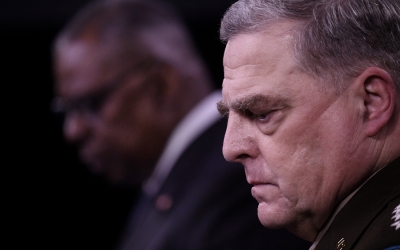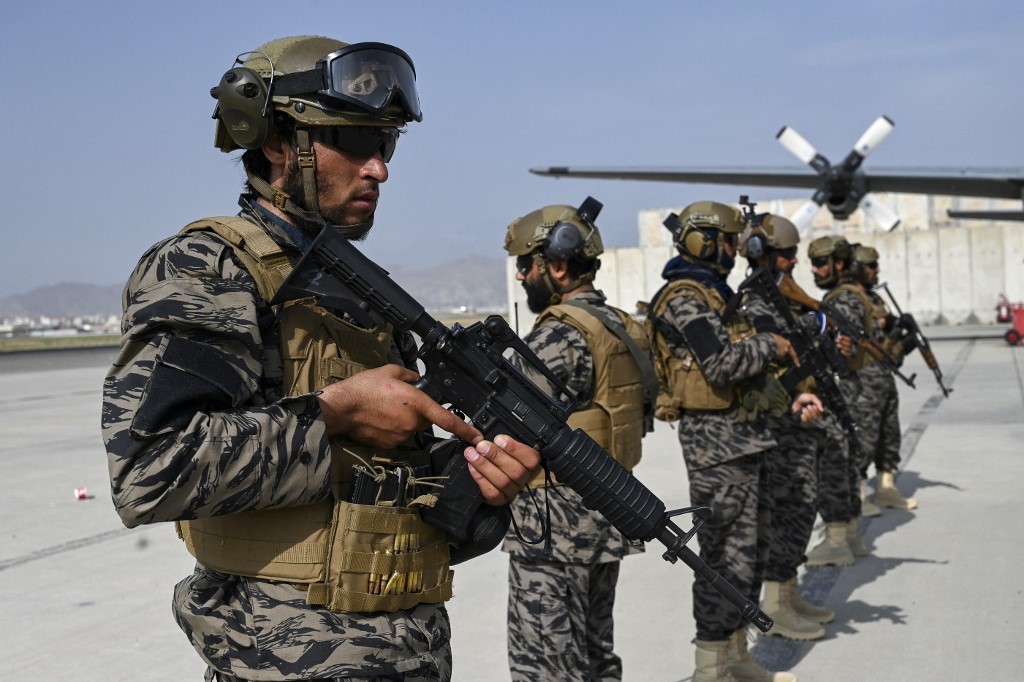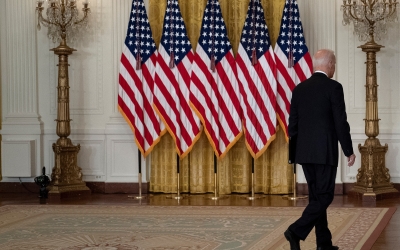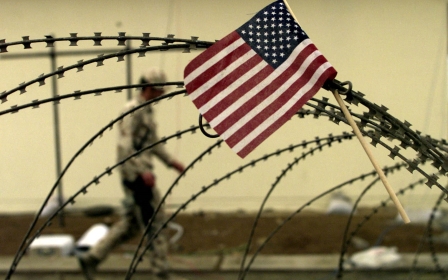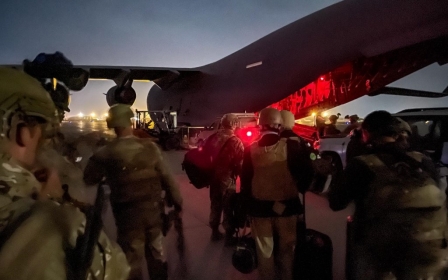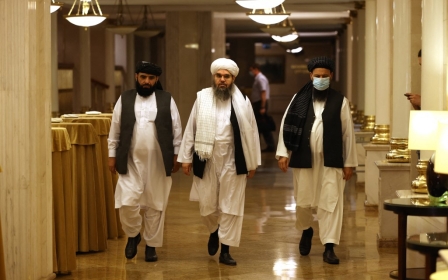Afghanistan: Should the world seize the Taliban's olive branch?
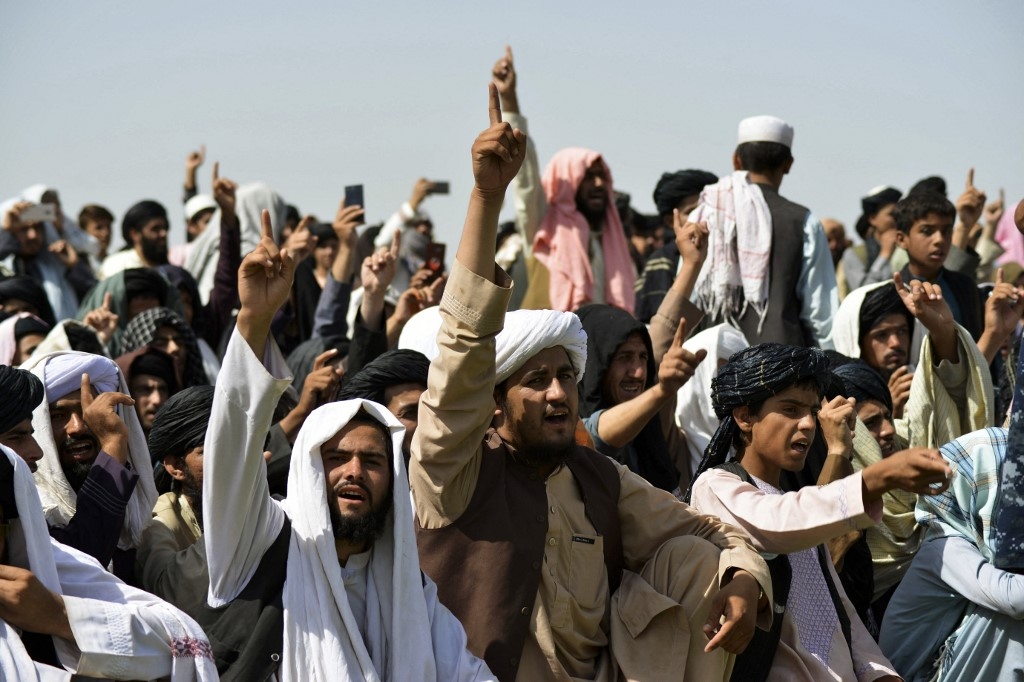
Once again, Afghanistan has been shown to deserve its reputation as “the graveyard of empires”. Let it serve as one more lesson among many others on what the mix of arrogance, ignorance, hubris and blindness typical of hegemonic western nations can do.
In recent decades, in Afghanistan and elsewhere, the world’s largest and most powerful empires - France, Britain, the Soviet Union and the US - have been defeated in bloody and humiliating ways by guerrilla fighters and nationalist resistance forces with only a fraction of the money and troops, and state-of-the-art weaponry that these states deployed against them.
Biden understands that the US is no longer in a position to be 'the world's cop'
The reactions of the US media and political class to the loss of Kabul and the so-called “Biden debacle” have been dominated by blame games, a hawkish pro-war narrative, vacuous expressions of anger at the “chaos” of the withdrawal, accusations of betraying “our allies” and endangering the future of Afghan women and minorities, and narcissistic laments about the consequences for the US image in the world and President Joe Biden’s own popularity.
Yet, despite the “chaos” of the evacuations and the acts of terrorism that were inevitable given the situation, a group of nations managed to safely evacuate 104,000 civilians in just two weeks under impossible circumstances, surrounded by heavily armed enemies - a task requiring the utmost professionalism, preparation, logistics and coordination. This included, notably, coordination with their historical adversary, the Taliban.
This is not “Biden’s debacle”, but rather the failure of the delusional US-Nato nation-building enterprise that started long before him and was doomed from the start. Biden has simply acknowledged that long defeat and put an end to the waste of American money and human lives, instead refocusing on other domestic and foreign policy priorities, such as the historic $3.5tn plan to rebuild and develop the nation’s infrastructure, or the “challenge” of China (which, with Russia, obsesses him as an old-school Cold Warrior).
New MEE newsletter: Jerusalem Dispatch
Sign up to get the latest insights and analysis on Israel-Palestine, alongside Turkey Unpacked and other MEE newsletters
Refocusing US priorities
The Afghanistan disengagement is not another sign of a new US isolationism, or some Trumpian indifference to the rest of the world. It is a conscious and timely refocusing of US strategic interests and priorities. Biden has rightfully assessed that the many costs of staying there for another five, 10 or 20 years would far exceed the meagre benefits.
He understands that the US is no longer in a position to be “the world’s cop”; that the Afghan regime, corrupt to its core, is hopeless; that the US presence and western money made it that way; that nation-building through military occupation or the attempt to export democracy and western values does not work; and that American interventionism should be more selective, strictly geared towards clear and well-defined national interests.
There is thus no disengagement from the world or abdication of hegemonic interventionism - the swift drone attacks against a branch of the Islamic State (IS) in Afghanistan helped to set that record straight - but rather, just good, old-fashioned American pragmatism, realpolitik, and a sound determination to better choose one’s causes. Afghanistan is no longer on that priority list.
The military and political disengagement from Afghanistan is in fact the quasi-seamless continuation of the previous foreign policies of both former President Donald Trump - who negotiated and signed the February 2020 Doha agreement with the Taliban - and former President Barack Obama, who was resolute to leave Afghanistan as soon as possible. Biden is merely completing the process, which is also fully congruent with Obama’s withdrawal of troops from Iraq.
Indeed, there has been a continuous effort, backed by the majority of the population, to end these “forever wars” and gratuitous, reckless militarist adventures.
Economic pressure
Contrary to the accusations heaped on Biden, the military disengagement from Afghanistan does not amount to a betrayal or an abandonment of the Afghan people. There are other ways to pressure the Taliban, or at least to control their worst excesses, on behalf of the Afghan population. Too many talk as though military occupation is the only way, while economic, political and diplomatic means may ultimately be more effective.
In order to govern, the new Taliban regime will desperately need the billions of dollars in foreign aid that is now frozen. This is real leverage; its resumption could be conditional on keeping promises on women’s rights and “inclusiveness”, eschewing revenge against former adversaries, and ensuring Afghanistan does not return to being a safe haven for terrorist groups, such as al-Qaeda. The old “carrot-and-stick” approach could potentially be more effective than military occupation.
To have a real shot at governance, the Taliban need the rest of the world far more than the world needs them. Whether they are sincere and have genuinely changed or this is merely, as most claim, a PR “charm offensive” to reassure and fool other countries, actually matters little.
Insincere as their promises of “inclusiveness” and greater tolerance may be, what should matter is not their words, but their concrete actions, policies and behaviours once their regime is established - a task that could take months.
Until we can see and judge, the wisest attitude from western and other governments would be to give the Taliban the benefit of the doubt, challenging them to keep their promises through coercive means, including - but not limited to - threats of military or economic retaliation should they threaten other countries’ national security or brutalise their own people.
Encouraging changes
No one is expecting free elections, western-style. Without doubt, there will be a regression for many, especially women. There have also been reports of executions of opponents and detainees, and alarming changes in Kabul over the past two weeks.
Yet, there are also encouraging signs of positive change from the cruel Taliban regime of 1996-2001, which are too numerous and striking to be immediately dismissed. As much as fighting, they have spent the last 20 years engaging in diplomacy at the highest levels. They have been received as ambassadors in regional and world capitals, and signed a groundbreaking deal with the US.
The Taliban is now the lesser of two (or more) evils, and they are extending an olive branch to the rest, including the West
They have developed a sharp and precise awareness of their regional and international environment, while gaining considerable diplomatic recognition and political legitimacy. Squandering these hard-earned gains would be stupid, reckless and suicidal.
The Taliban have urged women to continue to work and even join their future government, and they have declared an amnesty for Afghans who worked for the former government and foreign forces. They have promised that Afghanistan would not be used as a safe haven for terrorist groups to conduct attacks against other states.
They committed no organised massacres against the population when they took over Kabul, and they did not attack US troops, but rather cooperated with them in a massive and largely successful evacuation of foreign personnel and thousands of Afghans, though they urged their compatriots to stay. They have held talks with enemies, including former president Hamid Karzai, and shown moderation and restraint in victory.
Establishing diplomacy
Unlike al-Qaeda and IS, the Taliban are not global revolutionaries in the business of exporting their ideology or conquering the world. They are fundamentalist Islamist nationalists who want to rule “their” own country in peace. They would be perfectly happy to be left alone in isolation, but given their situation, they know they will need - if not the cooperation of other countries - at least their lack of hostility.
They are not seeking an enemy. They are uninterested in attacking or destabilising other nations or prolonging the Afghan civil war, which would be against their interests now that they have won militarily. Instead of acting as agents of regional destabilisation, they are keen to bring stability at home, establishing diplomatic and political relations with other nations.
They know full well that to run the country, they will need engineers, technicians, administrators, entrepreneurs, students and civil servants, possibly including those who served the former Afghan government and foreign troops. Killing them, as some are claiming they will do once the West is gone, would be self-defeating.
They are intensely aware of the many daunting challenges they now face in their own governance and nation-(re)building moment. They will need to win the trust of both the new generation of Afghans and the international community; keep their own international divisions and disagreements in check; get the economy going; forge new institutions, both local and national, to control the territory; and secure the country against groups such as IS, which will seek to destabilise it further.
There is now a real convergence of interests of all sorts - including economic, geostrategic and national security - among the Taliban, their immediate neighbours, and other regional and more distant powers, including China and the US, who have countless vested interests in bringing stability, order and peace to Afghanistan.
The world is thus at a crossroads. The Taliban is now the lesser of two (or more) evils, and they are extending an olive branch to the rest, including the West. Do we want to waste or seize that opportunity, at the risk of sacrificing the Afghan population to a rule that will no doubt be less than democratic?
The views expressed in this article belong to the author and do not necessarily reflect the editorial policy of Middle East Eye.
Middle East Eye delivers independent and unrivalled coverage and analysis of the Middle East, North Africa and beyond. To learn more about republishing this content and the associated fees, please fill out this form. More about MEE can be found here.



